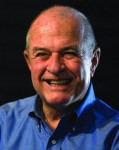
After Steve Jobs, What Now For Apple?
The death of Steve Jobs produced a remarkable flow of tributes. I cannot recall a response of this scale to the passing of anyone from the business world. The nearest was probably the death of Thomas Edison on October 18, 1931, when the New York Times ran two-dozen articles on his life and death. Many Americans observed President Hoover’s request on the day of Edison’s funeral to briefly turn off their electric lights at 10:00 p.m.
I like to believe that heaven uses Apple computers. If it does, then it will probably soon be converting to a new operating system. All Apple fans know that Steve produced an innovative new system every few years, adoption of which was only somewhat voluntary.
This illustrates his continuing drive for perfection that saw Apple become the world’s most valuable private company. Stockholders share understandable concern for the future of the company after his loss. For the time being, there are enough products in the pipeline to sustain momentum for a year or two. Apple stock is also reasonably valued at only 14 times earnings. After the anxiety-ridden selling this year, many other good stocks also share such muted valuations and a review of other companies that lost leaders may be instructive.
Edwin Land, founder of the Polaroid Corporation, like Jobs, had a passion for innovation coupled with an artistic vision. Like Edison, he was a scientist more than a businessman with 535 patents, which stands comparison with Edison’s 1,097. His instant cameras were huge consumer successes as were his presentations of new product announcements during the period when Polaroid stock was a favorite Wall Street growth story.
Unlike Apple, the company failed to plan for his succession or for a sustained product line. Digital photography killed its cameras and an instant movie system could not compete with videotape systems. It filed bankruptcy in 2001.
Eastman Kodak lasted longer. When George Eastman founded the company in 1892, photography had been around for over fifty years but was dominated by professionals with bulky equipment, much like data processing before desktop computers. The new Kodak cameras were almost given away in order to created demand for its processing services and chemicals.
Kodak grew through the years with its stock peaking in 2006 at $80. Polaroid’s instant process was a challenge that it addressed by stealing it, ultimately losing a patent suit to Polaroid in 1990 with almost a billion dollars damages, a record at that time. Japan’s Fuji Film presented another challenge, undercutting its retail sales. Although one of its engineers had invented the digital camera in 1975, its third crisis came from digital photography, which drove it out of its remaining camera business. Its stock trades now for a dollar.
Bill Gates left Microsoft in 2000 and the company seems to have lost its moxie, transitioning to a slow growth semi-utility. Intel’s Andy Grove stepped down as Chairman in 2005 and its stock remained flat or down until recently. The company has regained sales momentum, largely through sales to Apple, a demanding customer.
Apple attracts enormous attention from the financial and popular media. Stock analysts almost invariably underrate its new product announcements, as they did quite recently with its latest iPhone model. The analysts scoffed, and criticized the performance of the new CEO, but Apple then racked up a record million new orders in an hour. It will announce September quarter earnings within about two weeks. This is a nervous stock market but Apple usually provides positive earnings surprises and additional buys, under $400 if possible, should be rewarding.
There are two tests for Apple’s future stock performance. The objective one is whether it will be able to produce repeating revenue like the billions of dollars it reaps now from licensing “apps” for the iPhone and iPad. A more subjective test is whether it can sustain the excitement that its products produced during the Jobs period. After all, no other company mentioned here ever inspired its customers to put its logo on bumper stickers. Steve Jobs ignited people’s dreams, much like Hollywood does and Detroit used to. He cannot be replaced but he left his company with integrity, loyalty from both employees and customers and the world’s most valuable brand name, not a bad record.
Tony Crowell manages stock portfolios for individuals and their trust and retirement accounts with CROWELL•ROBERTS Investment Counsel, a registered investment advisor in Laguna Beach since 1993. [email protected] 949.494.1376/
800.697.2622 www.crowellroberts.com




